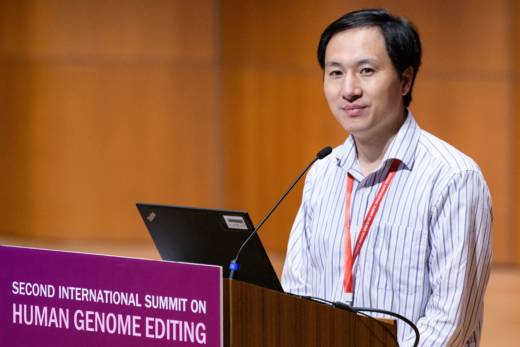“When Lulu and Nana were just a single cell, this surgery removed a doorway through which HIV enter to infect people,” He says in the video, one of several posted online to justify and explain the work.
Because the research has not yet been published in a scientific journal or carefully vetted by other scientists, many researchers and bioethicists remain cautious about the claim.
But, if true, many said the move would be historic, comparing it to the birth of Louise Brown, the first baby created through in-vitro fertilization, IVF.
“This event might be analogous to Louise Brown in 1978,” wrote George Church, a prominent Harvard geneticist, in an email. “Both anecdotal — yet healthy baby girls can have an impact,” Church wrote.
Meanwhile, He is now facing investigation by a local medical ethics board to see whether his experiment broke Chinese laws or regulations.
The university where He worked issued a statement that officials were “deeply shocked” by the experiment, which it stressed was conducted elsewhere. He, the statement says, has been on unpaid leave from the university.
Church and He are among hundreds of scientists gathering at the Second International Summit on Human Gene Editing in Hong Kong. The summit was organized try to reach a global consensus on whether and how it would be ethical to create genetically modified human beings with CRISPR.
The claims by He sparked immediate widespread criticism from attendees at the summit and elsewhere.
“This work is a break from the cautious and transparent approach of the global scientific community’s application of CRISPR-Cas9 for human germline editing,” Jennifer Doudna, a biochemist at the University of California, Berkeley, said in an interview. Doudna helped discover CRISPR and organize the summit.
”All of us that are here at this conference are struggling to figure out what was done and also whether the process was done properly. We just don’t know yet,” Doudna says.
But the claim “really reinforces the urgent need to confine the use of gene-editing in human embryos to settings where there’s a clear unmet medical need and where there’s no alternative viable approach,” says Doudna. She doesn’t think that is the case in this situation.
“If this was done to avoid HIV infection, there are alternative ways to prevent infection that are already effective,” Doudna says, such as “washing” the sperm of infected sperm donors to eliminate HIV. “Why would you use this instead of an already established approach?”
For their research, He and his colleagues say they used CRISPR to make changes in one-day old embryos in a gene called CCR5. The CCR5 gene enables HIV to enter and infect immune system cells. Scientists have long searched for ways to block this pathway to protect people from HIV.
He and his team say they used CRISPR to edit 16 embryos, and implanted 11 edited embryos into the wombs of women to attempt to create a viable pregnancy before the twin pregnancy was achieved, according to the Associated Press, which first reported He’s claims.
“No gene was changed except the one to prevent HIV infection,” He says. The twins appear to be healthy, and underwent detailed genetic analysis. “This verified the gene surgery worked safely,” He says.
Nevertheless, other scientists questioned whether the editing really worked, and argue that it is far too soon for the team to try the experiment.
“It is premature at this stage of technology,” wrote Shoukhrat Mitalipov, a scientist at the Oregon Health & Science University in Portland, Ore. Mitalipov was the first scientist to report using CRISPR to successfully edit human embryos, but stopped far short of trying to use them to make babies.
Other experts agree.
“Although I appreciate the global threat posed by HIV, at this stage, the risks of editing embryos to knock out CCR5 seem to outweigh the potential benefits,” wrote Feng Zhang, a CRISPR pioneer at MIT. Zhang noted that knocking out the CCR5 gene “will likely render a person much more susceptible for West Nile Virus.”
CRISPR enables scientists to make very precise changes in DNA much more easily than ever before. As a result, it’s revolutionizing scientific research and raising high hopes for major breakthroughs, including preventing and treating many diseases.
But making changes in human DNA that could be passed down for generations has long been considered off-limits. One reason is that a mistake could introduce a new disease that could be passed down for generations. Another is that it could open the door to “designer babies” — children that are modified for nonmedical reasons, such as to be taller, stronger or smarter.
“If it’s true as reported, then it’s an extremely premature and questionable experiment in creating genetically modified children,” agrees Jeffrey Kahn, a bioethicist at Johns Hopkins Berman Institute of Bioethics attending the Hong Kong summit.
But the development of CRISPR has prompted some scientists to rethink that prohibition for medical purposes. And researchers around the world have been racing to determine how it could be done safely. Many scientists believe it is inevitable, but should be restricted to situations where no alternative is available.
“If true, this amounts to unethical and reckless experimentation on human beings, and a grave abuse of human rights,” said Marcy Darnovsky, executive director of the Center for Genetics and Society, a genetic watchdog group.
“Throwing open the door to a society of genetic haves and have-nots undermines our chances for a fair and just future,” Darnovsky says.
Chinese researcher He acknowledges his work could spark criticism, but defends the step. “I understand my work will be controversial,” he says. “But I believe families need this technology. And I am willing to take the criticism for them.”
